Renault Clio: Exhaust: Precautions for the repair
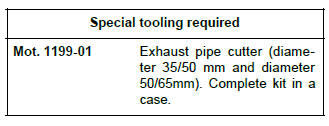
I - PARTS AND CONSUMABLES FOR THE REPAIR
1 - Parts always to be replaced:
- the exhaust trunking (if fitted)
- the seal or sealing ring on the connection between the catalytic converter or catalytic pre-converter and the rest of the exhaust system
- the exhaust clip(s) (if fitted)
2 - Consumables (see part no. in Technical Note 5068, 04B, Consumables - Products):
- exhaust mastic
- surface cleaner
- abrasive pads
II - ADVICE TO OBSERVE
IMPORTANT
Do not park and run the engine in a place where combustible substances and materials such as grass or leaves can come into contact with the hot exhaust system.
IMPORTANT
Catalytic converters contain ceramic fibres, these are contained within a closed unit, and cannot disperse.
Drilling or cutting catalytic converters is prohibited.
1 - During removal and refitting, the catalytic converter or catalytic pre-converter must not receive any knocks or impacts as this could damage it.
2 - The whole exhaust pipe is made of stainless steel.
3 - After working on the bracket between the catalytic converter or catalytic pre-converter and the rest of the exhaust system, ensure that the connection is perfectly sealed.
To do this:
- clean the pressure faces of the connection using the ABRASIVE PADS,
- degrease the pressure faces of the connection using SURFACE CLEANER and clean cloths,
- always replace the seal or sealing ring on the connection.
III - SPECIAL NOTES ON THE SINGLE UNIT EXHAUST PIPE
1 - Cutting the single unit exhaust pipe
The exhaust pipe is a " single unit type " .
To replace different parts of the exhaust system it must be cut.
To do this be sure to carry out these precautions in the following order:
- correctly identify the area to be cut, as explained below,
- use the cutting tool correctly (Mot. 1199-01),
- position the exhaust trunking correctly.
2 - Identifying the area of the exhaust system to be cut
Two marks made on the exhaust system define the area to be cut (see Exhaust: Parts and consumables for the repair) (see MR for vehicle concerned, 19B, Exhaust).
Example of cutting area
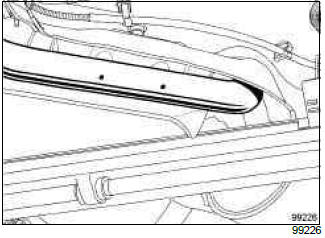
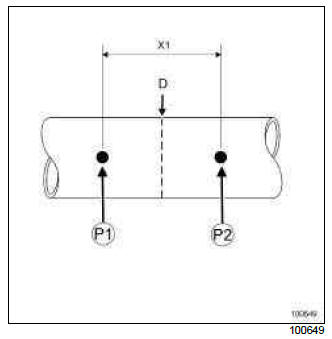
Before cutting the exhaust system, draw a line (D) between the two marks (P1) and (P2).
The distance between the two marks on the exhaust pipe is (X1) : 90 mm (all types except RENAULT SPORT).
The distance between the two marks on the exhaust pipe is (X1) : 80 mm (RENAULT SPORT).
Note: For CLIO II RENAULT SPORT with F4R*730, F4R*732 and F4R*736 engines, the cutting area is shown by a single mark on the exhaust pipe.
Cut the exhaust pipe by placing the (Mot. 1199-01) on the mark.
3 - Operate tool Mot. 1199-01
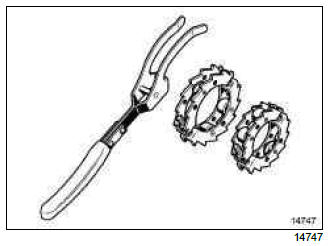
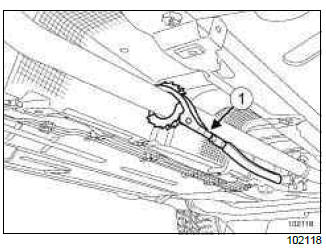
Fit the (Mot. 1199-01) (1) on the exhaust pipe.
Tighten the two bolts on the tool until they touch the pipe in order to clamp the tool onto the pipe.
Turn the cutting tool using the handle and pressing it against the pipe (as indicated in the diagram above).
Tighten the two bolts on the tool whilst cutting, until the pipe is completely cut.
Note: Do not over-tighten the tool onto the pipe to avoid deforming it.
Once the pipe is cut, file and deburr the end of the pipe to be used on the vehicle again.
4 - Positioning the exhaust trunking
WARNING
Do not reuse an old exhaust trunking.
Exhaust trunking with 1 bolt
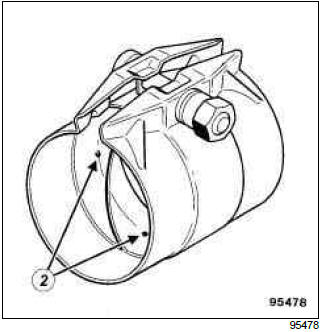
Exhaust trunking with 2 bolts
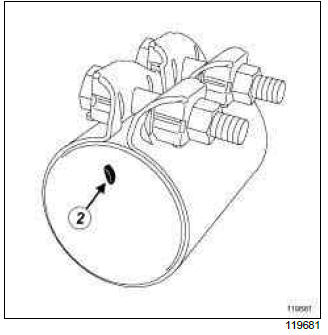
Fit the exhaust trunking onto the part of the exhaust system fitted to the vehicle.
Position the pipe onto the lugs (2) inside the exhaust trunking.
Tighten the exhaust trunking bolt(s) slightly (depending on the version).
Position the second part of the exhaust system under the vehicle, fitting it in the exhaust trunking.
Note: If necessary, use a workshop jack to lift and hold the heavy and bulky components of the exhaust system.
Position the second exhaust pipe onto the lugs inside the exhaust trunking.
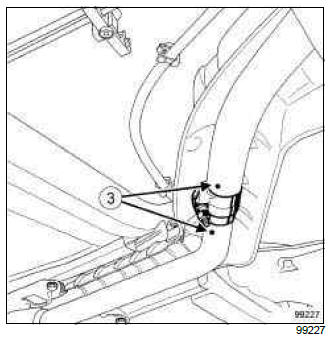
Check that the two cut marks (3) are aligned (if applicable).
Position the trunking so that there is no risk of contact between its bolt or bolts and the heat shields.
Torque tighten
- the exhaust trunking nut with 1 bolt (25 N.m) (if fitted),
- the exhaust trunking nuts with 2 bolts (18 N.m) (if fitted).
Check the following and deal with if necessary:
- no underbody contact between the exhaust system and the heat shields,
- all of the heat shields are present and secure.
Note: Any damaged heat shields must be replaced.
Start the engine.
Check that there are no leaks: deal with any leaks.
Note: If there are leaks from the EXHAUST TRUNKING WITH 1 BOLT, apply EXHAUST MASTIC to the trunking (see part no. in Technical Note 5068, 04B, Consumables - Products).
If the application of exhaust mastic does not fix the leak:
- remove and replace the used exhaust trunking,
- check the condition of the exhaust pipes (condition of the pipe surface, deburring of the area cut, damage to the pipes).
- fit the new trunking in accordance with the instructions given before.

